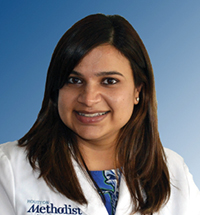Posted on Sep 30, 2016 in
FOCUS ON THE CURE

Utsavi Shah, MD
Houston Methodist
Sugar Land Hospital
Knowledge is power when it comes to these four unchangeable factors in developing breast cancer. You might think you’re safe from breast cancer if no one in your family has had it. But family history is just one of the factors that determines your risk for the disease. One in eight women will be diagnosed with breast cancer in her lifetime, and 85 percent of those diagnosed have no family history.
“It is important for everyone to increase their awareness about their personal risk of breast cancer,” said Utsavi Shah, MD, an OB/GYN on staff at Houston Methodist Sugar Land Hospital.
Here are four of the greatest risk factors for breast cancer.
Your Age
The number of candles on your birthday cake affects your risk level most. The majority of women diagnosed with breast cancer are older than 50, and the risk increases as you age. What’s more, two of every three invasive breast cancers found are in women 55 and up.
Your Background
Asian, Native American and Hispanic women have lower odds of developing breast cancer and dying from the disease. On the other hand, Caucasian women are more likely to be diagnosed, and African-American women are at greater risk of dying from breast cancer. This may be important to consider if another risk factor exists.
Your Family Tree
If your mother, sister or daughter has had breast cancer, your risk is doubled. But if that’s not the case, you’re not necessarily in the clear. Less than 15 percent of women diagnosed with breast cancer have a family history of the disease, which means it’s important to schedule the screenings that are right for you.
Your Genes
Thanks to celebrities like Angelina Jolie, you might know that a woman who has the BRCA1 or BRCA2 gene mutations is at higher risk for breast cancer, as well as ovarian cancer.
“The goal is to find the gene mutation in women before they develop cancer,” said Shah. “A simple blood or saliva test can tell a woman whether she’s at high risk.”
If your personal and family history warrants it, your physician may recommend genetic testing, which looks for altered BRCA genes and other mutations. The results can help your doctor determine screening recommendations, medications to reduce the risk of a cancer diagnosis and even preventive surgery.
Talk with your physician if you have a family or personal history of the following:
• Breast cancer at age 50 or younger
• Ovarian cancer at any age
• Male breast cancer at any age
• Ashkenazi Jewish ancestry and a personal or family history of breast or ovarian cancer
• Two breast cancers in the same person or on the same side of the family
• Triple-negative breast cancer at age 60 or younger
• A previously identified BRCA1 or BRCA2 mutation in the family












